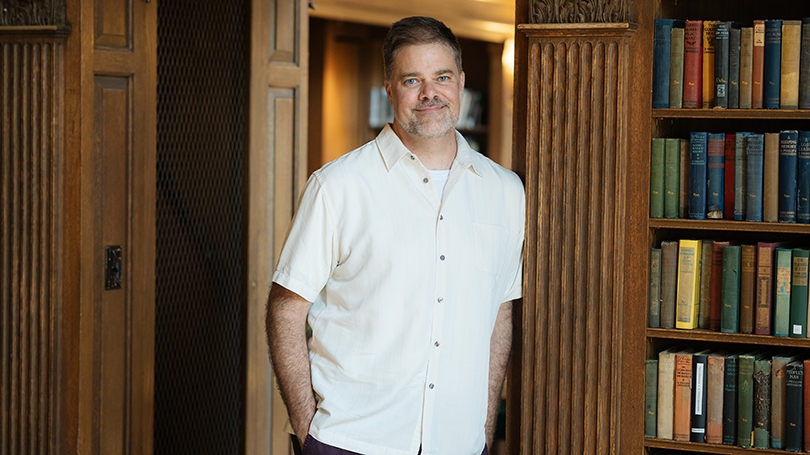Professor of Mathematics Scott Pauls will be the new director of the Dartmouth Center for the Advancement of Learning (DCAL), announced Interim Provost David Kotz.
Pauls, chair of the mathematics department and a faculty member in the Program in Quantitative Social Science, succeeds Professor of Government Lisa Baldez, whose four-year term leading DCAL has concluded. Pauls begins his new role at DCAL this week; he will continue teaching in the math and QSS programs.
“Scott Pauls is the consummate scholar-teacher,” says Kotz. “His work in applied mathematics and pure mathematics is highly respected, and he has been committed to mentoring and advancing pedagogy throughout his career. Scott is ideally suited to carry on the important and innovative work that flourished at DCAL thanks to Lisa Baldez and the center’s talented staff.”
Pauls says he is looking forward to leading DCAL, which works to improve teaching and learning by providing resources, removing barriers, promoting evidence-based practices, and building partnerships across all of Dartmouth’s schools.
“In my book, the big job of DCAL is to provide the resources that the faculty needs to improve their pedagogy and teaching, and ultimately the experience of the students in the class,” he says.
Pauls has mentored undergraduate and graduate students in math and the interdisciplinary uses of quantitative computation in a number of subjects, from biology to government to game theory. He is a member of the steering committee for the First-Year Student Enrichment Program (FYSEP), which provides support for first-generation college students, and he has developed experiential-learning curriculums and integrated undergraduate learning fellows into his classes in concert with DCAL.
“We’ve found that students can learn much better, much faster, and in a much deeper way if course work is incorporated into a meaningful experience tied in with things they are interested in and see as working toward a goal,” Pauls says.
Enabling faculty and students to integrate classroom innovations is DCAL’s prime mission, he says. “The overarching goal of this is to bring the pedagogical quality at Dartmouth, which is already very high, to an even higher level so that students have the best opportunities to learn and succeed here.”
Kotz praised Baldez’s leadership, citing the development of the experiential and digital learning initiatives and the learning fellows program during her tenure.
“She has been instrumental in building on DCAL’s reputation as a place where educators from across the institution can build a community of practice around advancing learning while also receiving the resources and support they need to reach their teaching goals,” Kotz says.
Pauls says he is committed to continuing the cooperative and innovative spirit that Baldez brought to DCAL. Among his priorities are promoting experiential learning opportunities across the curriculum, integrating undergraduate and graduate students as part of pedagogical teams through the learning fellows and other programs, and developing an efficient method of evaluating the effectiveness of teaching innovations across the institution.
The members of the DCAL director search committee were Deborah Brooks, associate professor of government; Josh Compton, associate professor in the Institute for Writing and Rhetoric; Thomas Jack, professor of biological sciences; Barbara Knauff, associate director of academic technologies and client services; Kerry Landers, assistant dean of graduate student affairs; Katherine Milligan, program director for the master of health care delivery science program; and Greg Ogrinc, senior associate dean for medical education.
William Platt can be reached at william.c.platt@dartmouth.edu.
